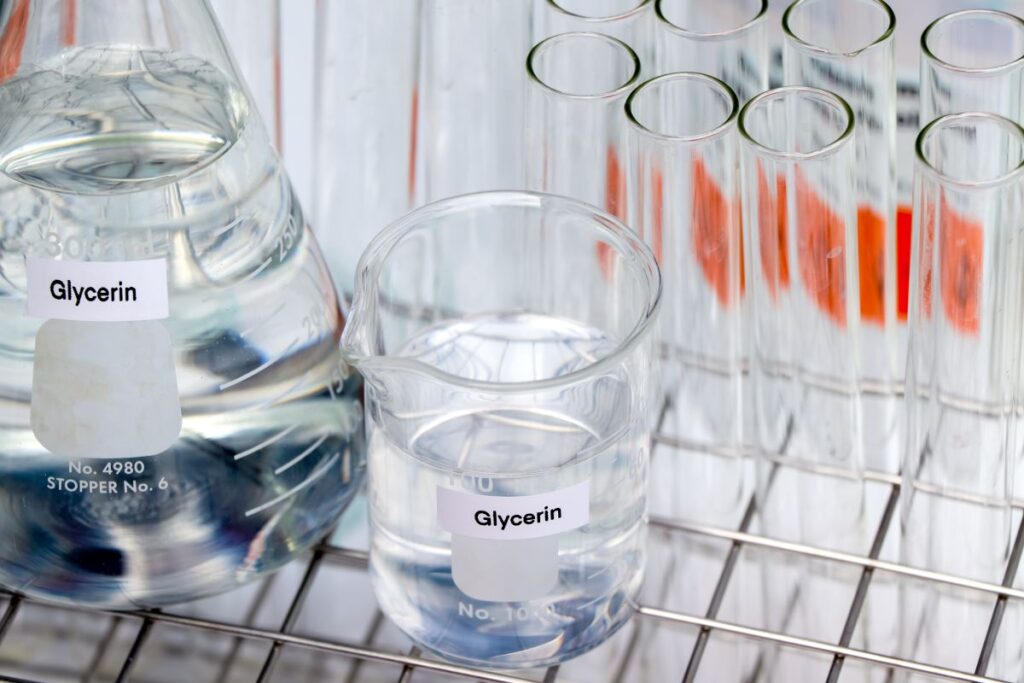Reviewed by: Dr. Robert Menardi, DVM
Devoted pet parents (like you) are often on the lookout for healthy treats and beneficial supplements for their beloved companions. Perhaps you’re even the type who reads the fine print and compares ingredient lists to ensure your pooch ingests only the best. If so, you may have noticed a recurring ingredient that appears on various pet products, including treats and dental chews: glycerin. What is glycerin — and is it bad for dogs? Discover more about this widely used compound and how it appears in your dog’s diet and products.
Table of Contents:
- What is Glycerin?
- Is Glycerin Bad for Dogs?
- The Benefits of Glycerin
- Is Coconut Glycerin Better for Dogs?
- The Bottom Line
What is glycerin?
Glycerin, also known as glycerol, is a colorless and odorless liquid produced from natural fats and oils. It can be derived from animal or vegetable origins and is widely used across multiple industries, including food and pharmaceuticals. In the pet care industry, glycerin is often added to pet treats, dental care, and even shampoos as a safe and non-toxic additive.
Is Glycerin Bad for Dogs?
In short, no. Vegetable glycerin is approved as a preservative ingredient in pet food, according to the U.S. Food and Drug Administration (FDA). It is non-toxic and safe for pets in recommended dosage quantities. However, not all ingredients on the market are created equal, and it’s important to know what you’re giving your dog — so sourcing your treats, supplements, and products from a trusted and third-party tested brand will give you the reassurance that your dog’s health is in good hands.
Furthermore, if your dog is diabetic, you should consult your vet about which ingredients to avoid and healthy treats to manage your dog’s condition.
Benefits of Glycerin
- Taste: Glycerin is known for its sweet taste, making it an appealing ingredient for pets. It can enhance the flavor of treats, encouraging picky eaters to indulge in their snacks.
- Texture: Glycerin has humectant properties, which means it can help retain moisture and bind treats for consistency and texture. In pet treats, this quality can contribute to a chewy texture and prevent them from becoming dry and unappetizing.
- Dental Health: Glycerin is commonly used in dental chews because of its ability to help maintain moisture in the treat, promoting saliva production. Increased saliva can aid in reducing plaque and tartar buildup, contributing to better oral health in dogs.
How Can Glycerin Affect My Dog?
- Calorie Content: Glycerin is a calorie-dense carbohydrate that contains slightly more calories per gram than sugar. While it is safe in moderation, excessive consumption may contribute to weight gain. As with any treat, it’s essential to consider your pet’s overall diet and adjust their daily caloric intake accordingly.
- Digestion: In minor doses, glycerin should not impact your dog’s digestion. Though rare, some dogs may be sensitive to glycerin, experiencing digestive issues such as diarrhea or upset stomach. If you notice any adverse reactions in your pet after consuming glycerin-containing treats, it’s crucial to consult with your veterinarian.
- Quality Matters: Not all glycerin is created equal. Some pet products may use low-quality glycerin, which could potentially contain impurities. Opting for supplements from brands like ElleVet that prioritize ingredient quality can help mitigate this concern.
Coconut Glycerin for Dogs
Coconut glycerin has gained popularity as a natural alternative to traditional vegetable glycerin. Extracted from coconuts, it provides an appealing alternative for pet owners seeking a more wholesome treat or CBD + CBDA supplement for their canine companions. So why should you consider coconut as an alternative to traditional glycerin?
Flavor: Coconut glycerin imparts a mild, sweet flavor to pet treats, making it palatable for even the most discerning canine taste buds. Many dogs find the subtle coconut undertones extremely tasty.
Healthier Fats: Coconuts are rich in healthy fats, and coconut glycerin retains some of these beneficial properties. While moderation is key, the inclusion of healthier fats can contribute to a glossy coat and support overall skin health in dogs.
Antimicrobial Properties: Coconut has natural antimicrobial properties, which may offer additional oral health benefits. While not a replacement for proper dental care, coconut glycerin’s antimicrobial properties might complement your dog’s overall dental hygiene routine
Of course, you should bear in mind the risks associated with introducing a new food into your dog’s diet. While coconut allergies are relatively rare in dogs, it’s crucial to be aware of any potential sensitivities. Introduce coconut glycerin treats gradually and monitor your pet for any adverse reactions.
The Bottom Line
When used in moderation and sourced from reputable sources, glycerin can be a safe and beneficial ingredient in dog treats. For a high-quality and healthy alternative, consider sourcing pet products that prioritize coconut glycerin as an alternative to vegetable. As always, understanding your pet’s individual needs and consulting with your veterinarian will guide you in making the best choices for your furry friend’s diet and overall well-being.
For more information about pet health and wellness, check out the ElleVet blog. We offer resources and tools for all pet parents looking to support their pets’ health and wellness.








